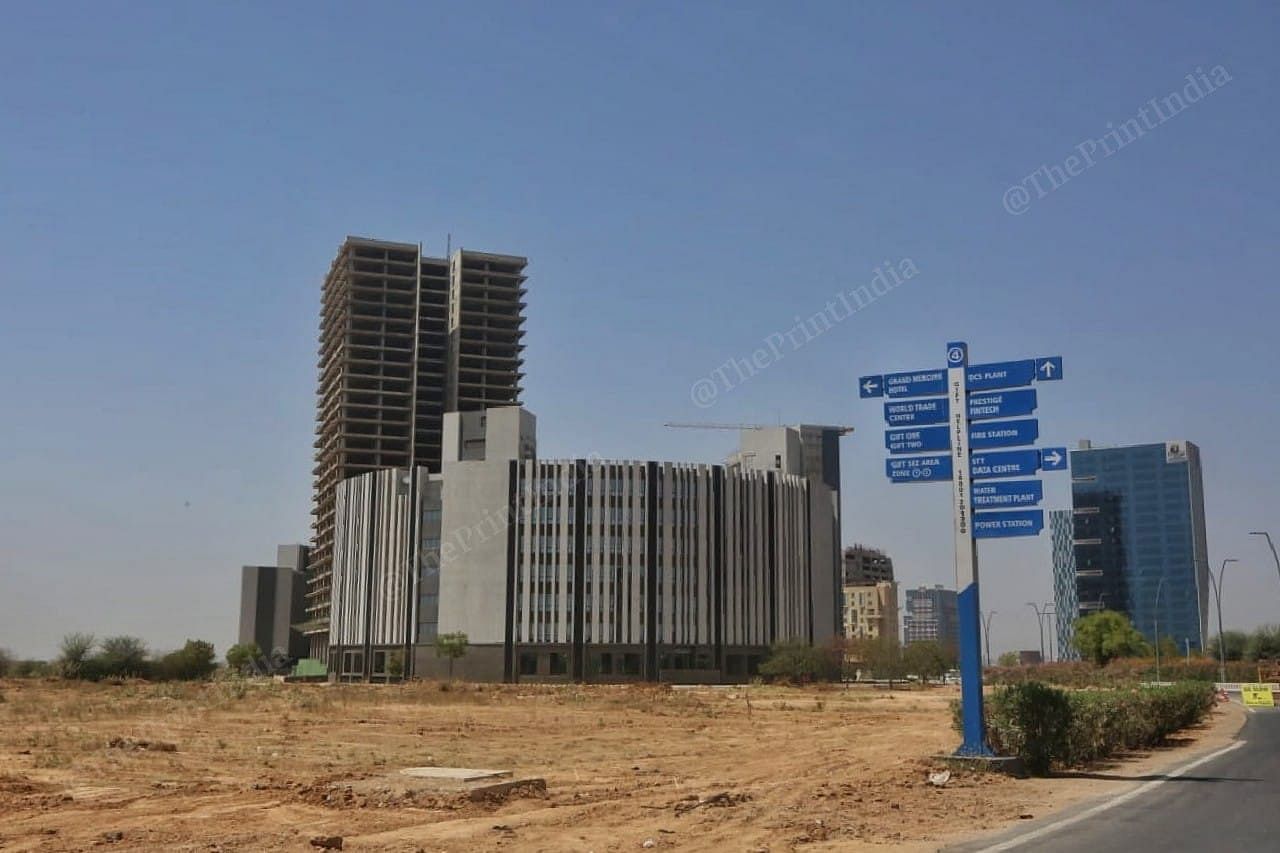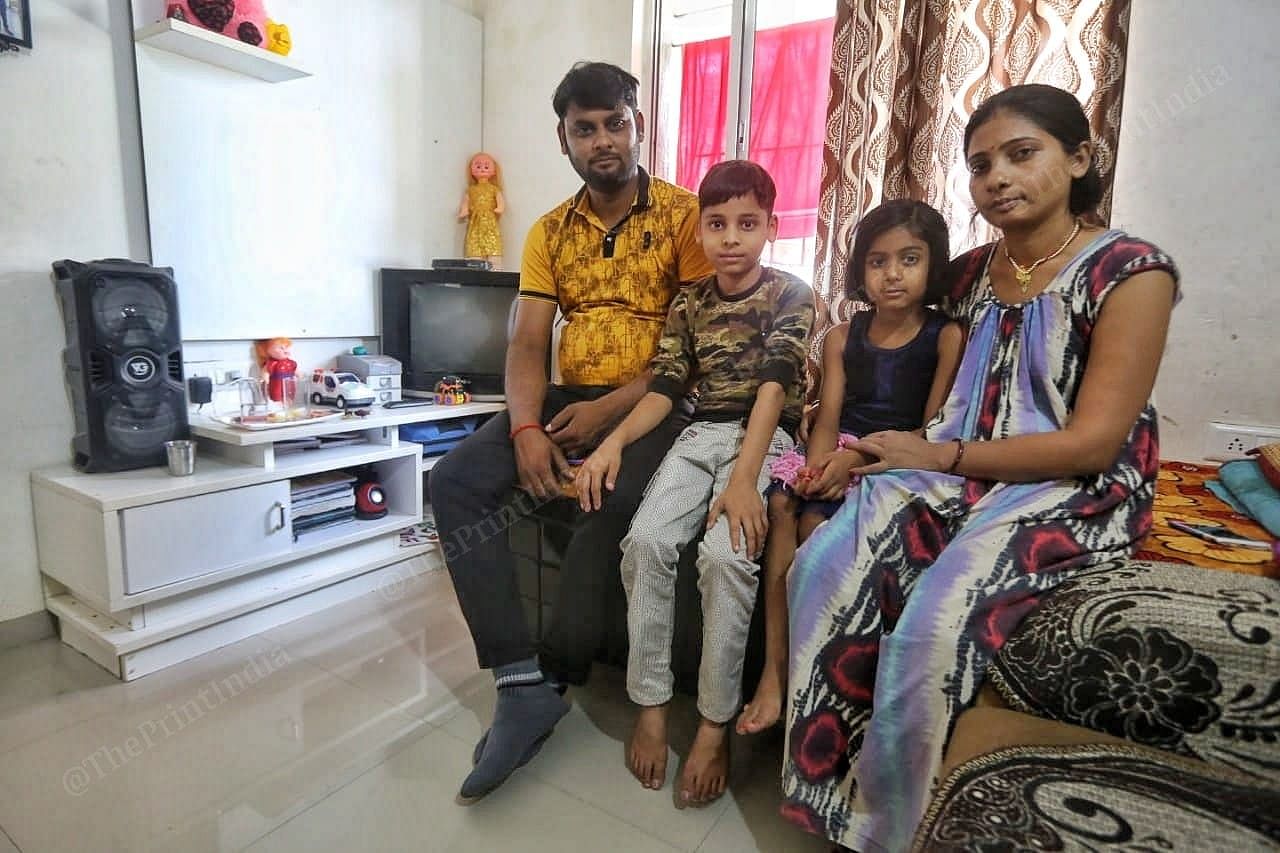GIFT City/New Delhi: Off the National Highway 8 that connects Ahmedabad with Gujarat’s capital Gandhinagar, a handful of tall, shiny buildings tower over the smaller settlements along the highway.
These skyscrapers are part of the Gujarat International Finance Tec (GIFT) City, the country’s first business district housing an International Finance Service Centre (IFSC) and special economic zone for domestic and international financial services.
The city, built on the banks of the Sabarmati river, was planned across 886 acres and 62 million square feet, with an aim to create 5 lakh direct jobs when complete. The city was going to be India’s attempt to capture business from financial services hubs like Singapore and London by offering investors various incentives to conduct their foreign financial transactions in this hub.
The construction work began in 2012 and making the city a viable option for foreign nationals to settle down was a top priority. This meant installing infrastructure not seen even in the country’s most metropolitan cities — an underground utility tunnel for electricity, garbage chutes, a district cooling system, and potable water through all taps — all of which are up and running in the campus.
Also read: Reluctant emerging Asia, including India, could delay real interest rate hikes until 2022
A work in progress for nearly a decade
But nine years since the foundation stone was laid down, the campus is still a work in progress. At best, it is a patchwork of state-of-the-art facilities and incomplete, under-construction structures.
The campus is dotted with incomplete buildings and lacks any recreational or entertainment centres that will cater to the city’s prospective residents.
Several empty plots carved out for malls, petrol pumps, office complexes and apartment buildings are yet to come up. Only one single residential building stands tall in the city that had promised a walk to work experience for the people working there.
Besides the incomplete infrastructure, questions also remain on when the GIFT City will become fully operational and achieve its potential.

Why the city is yet to take off fully
The GIFT special economic zone aims to offer a wide range of services like various capital market transactions, banking related services, offshore asset management and other financial services transactions.
Its USP or unique selling point is that despite the fact that it is located in India, it is considered an offshore jurisdiction for most regulatory purposes. This means that most local laws like tariffs and other regulations don’t apply. Special set of laws have been designed for this centre for facilitating capital flows without any restrictions.
There are several reasons why the city hasn’t yet managed to become another Singapore.
For one, the Indian rupee is not freely convertible. This means that there are restrictions on certain overseas transactions that are imposed on Indian companies and individuals. This reduces the attractiveness of GIFT City for companies and individuals alike.
The regulators have also been slow in easing restrictions worried about the fallouts of liberalising regulations to attract foreign and domestic capital. To some extent, the easing of regulations over the second half of the last fiscal has addressed some of these concerns but there is still a long way to go for the city to carve out its own USP to attract well established investors from centres like Singapore and London, according to market participants.
In an opinion piece in February, Bloomberg columnist Andy Mukherjee aptly summarised why that GIFT City may fail to emulate Singapore. He pointed out that India is offering incentives in the city that no global investor is looking for. He pointed out that Singapore’s success wasn’t due to tall buildings but because it managed to meet some essential pre-conditions for becoming a successful financial services centre.
He wrote: “A freely convertible currency, pragmatic regulation, a stable tax regime, rule of law and speedy dispute resolution played a huge role. (Good schools and pubs helped, too.)”
Rajesh Gandhi, partner in Deloitte India, said that while there have been many regulations announced in the past few months that have considered many of the concerns of investors, actual on ground interest has not seen much improvement.
“This is partly due to Covid-19 and partly because most firms are preferring to retain the status quo for now. While the regulations have been sufficiently amended to make it attractive for non-residents, more steps need to be taken for making it attractive for resident investors,” he said.
Also read: ‘World’s fastest recovery’ outlook for India at risk as second Covid wave hits country
Not lagging behind, say Gift city officials
GIFT City officials, however, countered the narrative that its progress has been slow and it has not lived up to its initial hype, adding that timelines needed to be looked at in context.
“The city was conceived in 2007, but land allotment happened only in 2011. Work started in 2012, business regulations given in 2015, an international exchange established in 2017, and in 2020 an IFSCA chairman appointed. In this short span of time, 148 companies are registered in the special economic zone and 225 in the domestic zone, and 11,000 people are working here,” said a senior source associated with the GIFT City.
“All our domestic financial services have traditionally been in Mumbai, but international finance services are done in Singapore or Dubai. The idea of the GIFT City was to bring both international and domestic finance services in one place,” he said. “It isn’t an attempt to compete with any existing city, but to come up with a place that is self-sufficient.”
Some of the large companies operating in the domestic zone include Tata Consultancy Services, Bank of Baroda, and Oracle, while the SEZ houses Bank of America, National Stock Exchange and Aditya Birla Capital, among others.

Spurt of changes over the last few months
There has been a spurt of positive developments over the last few months that could see activity picking up in the GIFT City.
The changes, mainly related to the IFSC that has been set up at GIFT City, aim to encourage domestic and international institutions to carry out offshore financial transactions in India.
To counter the problem of getting a nod from multiple financial services regulators like the Reserve Bank of India and Securities Exchange Board of India in the IFSC, a unified regulator called the International Financial Services Centre Authority (IFSCA) was established in April 2020. It is expected to facilitate a single window clearance as well as regulation.
A host of measures like tax treatment of alternative investment funds, aircraft leasing, steps to encourage foreign offshore funds to relocate to India and setting up of a fintech hub announced in the Finance Act of 2021 as well as several regulations announced last year to facilitate provision of services like banking and broking are further aimed at attracting investor interest.
In April alone, around 25 companies had lined up investment proposals in the GIFT IFSC. According to the source quoted above, the 15 banks at the IFSC have generated transactions worth $51 billion till March 2021, and the average daily volume on the stock exchange is $17 billion.
“Without the IFSC, this business would have gone elsewhere, to other countries. But it’s been made possible here in India,” he said.
Tapan Ray, Group Chief Executive and Managing Director of GIFT City Company Ltd, told the Indian Express in an interview earlier this year: “It is difficult to quantify the business that GIFT City has attracted from overseas. But the trend has started. For instance, applications from half a dozen, India-centric Alternative Investment Funds from places like Singapore, Mauritius and within India have come. Things have picked up after the unified regulator has come.”
Mehul Pandya, Executive Director at Care Ratings, said the regulatory changes announced were important and required. “It has increased the overall attractiveness of GIFT City. There were always fears of some overlap between regulators. But the unified regulator has brought in much needed clarity for investors. I believe the interest evinced by prospective targets will increase in the coming months,” he said.
“Over the last 3-4 years, there have been some concrete developments like a unified regulator, the bullion exchange regulations, currency derivative trading and banking regulations. Foreign broking firms have also been allowed. There is a lot of support from the central government,” added Pandya.
In a 6 April note, Nishith Desai and Associates said the establishment of IFSCA to act as a single-window for regulating activities in an IFSC has already proven an effective tool for rapidly implementing stakeholder asks. “It should help build investor confidence through consistency, transparency and clarity in policy measures as GIFT City continues to develop,” it said.
Also read: India’s Covid crisis now makes global oil demand recovery by July impossible
No social life for Indians, leave alone expats
For those living on the campus, the city isn’t quite liveable yet because of a lack of connectivity and recreational activity — particularly bars and pubs. A complete ban on alcohol hasn’t helped matters either in attracting Indians and expats.
“We get a tax rebate, so that’s good. But there are no Ubers, no Zomato, no Swiggy. No places to go out or eat in. There’s no alcohol. It’s difficult for bachelors to live here,” said Pankaj Agrawal, who moved from Gurugram in the National Capital Region to live and work in GIFT. “I’m considering leaving,” he said.
Ankush Singh, who also lives and works in the city said, “The other problem is the language barrier. Most people are from Gujarat itself and speak Gujarati, so it can be difficult to fit in.”
Others from more modest backgrounds who run small establishments within the city — restaurants and cafes — have felt the effects of the pandemic on their businesses, but still retain a sense of hope in the city’s future.
Abhay Singh owns a small restaurant and a cigarette shop inside the premises, and lives with his family in an apartment he bought in the city’s lone residential complex called Janadhar.
“I bought a 1BHK for Rs 7 lakhs. I used to work on construction in Dubai, so compared to that, development here is very, very slow. Because things are moving slowly, and the pandemic hit, I’m considering closing the restaurant. There’s just not enough footfall,” he told ThePrint.

“Business might be slow, but I’m certain it will pick up. When I first came here, there was only one building, but now it’s far more developed than that. People will come slowly. I’m confident I made the right decision in moving and living here,” he said.
(Edited by Amit Upadhyaya)
Also read: Why tax and spend could be the new mantra for Modi government




Some of the stuff written over here about the infrastructure is already outdated.
at least something being built and not all money spent on freebies, scams, loot, corruption, dynasty
That is a cheap shot, a back handed slap of a decade of incompetent governance of the current PM . What does it have to do today in the midst of a pandemic? During the election it was all ra ra for a Right wing PM getting reelected for another 5 years!! To his voters, Hindutva matters more than another promise. For his Bhaktas even a big promise is unique and is worthy of a vote. No one affected in a win-win deal. What does it matter to the useless rest???
Considering the actual work started only after 2014, and the level where India’s regulatory authority currently are, GIFT has actually made quite some astounding progress. It takes decades to build a Financial capital like Singapore and Hong Kong. Right now, the city’s goal seems to be to build good infrastructure, that lasts for a long time, and from what I’ve seen and read, it’s going good. Give it 4-5 years, let the Effects of pandemic wear off and maybe then an actual analysis could be done. It’s too early rn.